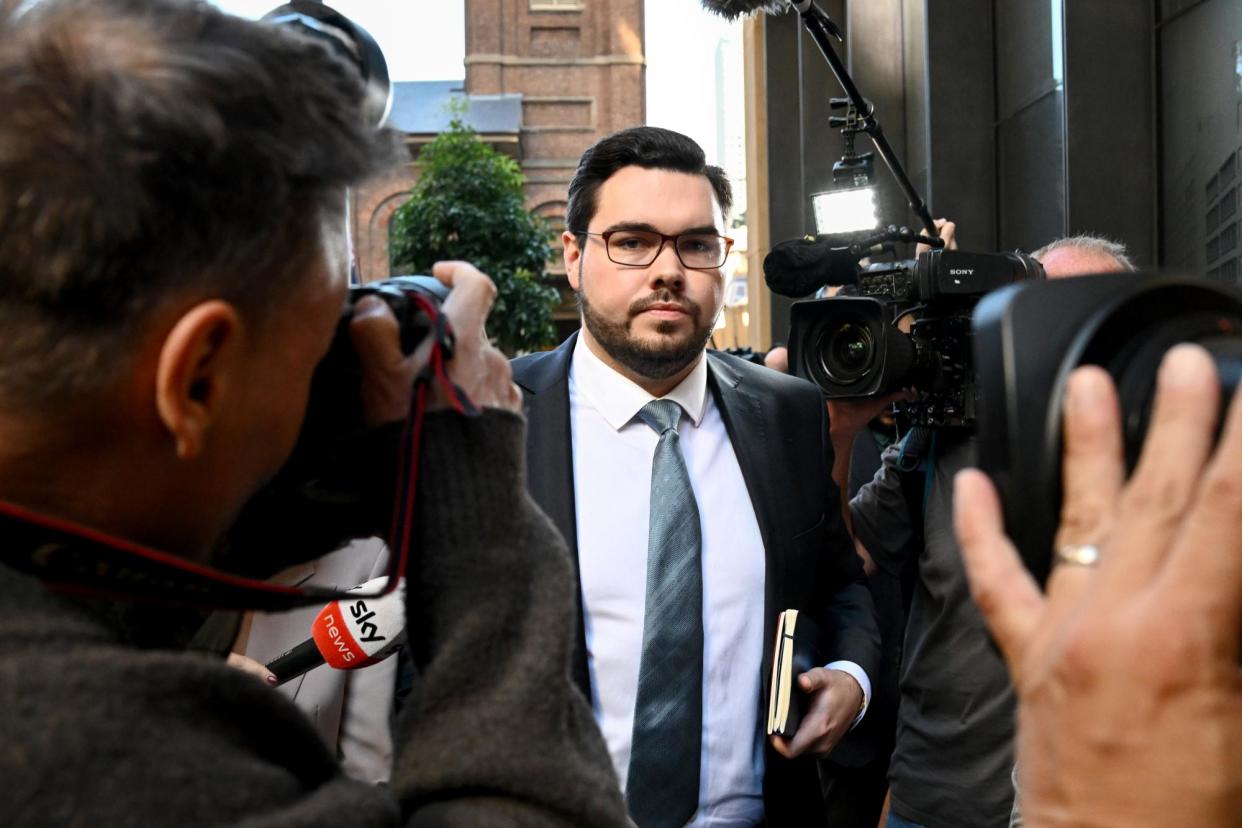Bruce Lehrmann defamation trial: why legal costs could run to $10m

Between $8m and $10m in legal costs for the Bruce Lehrmann defamation trial is an eye-watering figure for the public to grapple with.
How does a 24-day civil trial end up costing so much, and who gets the money?
On Tuesday the federal court released the parties’ submissions on costs ahead of a hearing on costs scheduled for 1 May. No figures were mentioned but legal experts have estimated the total cost to be as high as $10m.
But this headline-grabbing case is exceptional. Legal experts say the millions spent is no surprise but is exceedingly rare.
How much does a defamation case cost?
For starters an applicant, Lehrmann in this case, would have a raft of fees for a single day in the federal court, including a hearing fee of at least $5,000; a transcript fee of $3,000, a senior counsel for $10,000; a junior counsel for $3,000 and two solicitors for a total of $8,000.
Defamation matters don’t always rack up this quantum of costs, and often don’t, according to Dr Michael Douglas, a defamation consultant at Perth law firm Bennett.
In so-called back yard defamation cases, involving non-famous people, there might be one less-expensive lawyer “because the client can’t afford Sue Chrysanthou”, Douglas told Guardian Australia.
Chrysanthou, who acted for the former Project host Lisa Wilkinson, commands $8,000 a day. For every day in court, with her solicitor, the bill is $12,000. And that’s before any preparation days.
But this defamation case is not run-of-the-mill. It is notable because it involved a big media company, Ten, and multiple high-profile names. Each party invested significant resources in winning because the stakes were high.
Why did Lehrmann’s case cost so much?
The key to the cost of the Lehrmann v Network Ten and Lisa Wilkinson case is on the federal court website in the long list of exhibits.
There were more than 1,000 separate exhibits, including hours of CCTV footage as well as audio and video recordings and photographs, and dozens of affidavits.
“If you think every single exhibit is a piece of evidence that requires a solicitor to find the thing, to check whether it’s relevant, to check whether it can be used as evidence or if it’s privileged, and then to talk to their superior about it, you’ll see how much is involved in terms of human time,” Douglas said.
In Network Ten’s submission on costs, filed on Tuesday, there are three names at the end of the 14-page document, listed in order of seniority, starting with Dr Matt Collins. Each one has to be paid for each hour they put into the case.
Legal experts say every day in court Ten would have paid for a transcript at $3,000, Collins at $12,000, junior counsel at $3,000 and on some days up to five solicitors at $15,000.
Silks who specialise in defamation can cost in the order of $1,000 an hour, although their counterparts who work in commercial law can command as much as $20,000 a day.
“Lawyers typically charge per hour for their time, like lots of service industries, and it’s just that there’s been a tremendous amount of human effort going into this and the public sees the end product – what’s argued in court,” Douglas said. “But for every five minutes senior counsel was on their feet arguing in court there’s a lot of time in addition spent behind the scenes by a team of people making that happen.”
Those people include solicitors, researchers, administrative staff and experts.
Tasks include photocopying, handling exhibits, swearing affidavits and preparing witnesses.
Expert witnesses, such as the UK-based lip-reader Tim Reedy who interpreted the CCTV footage of Brittany Higgins and Lehrmann at The Dock, get paid for their time and travel costs.
Leading up to the trial there is a lot of work to do. In this case it was estimated to be 20 days for Ten, which had to prepare over 20 affidavits, while Collins had to prepare his cross-examination of Lehrmann.
Lehrmann’s legal team, led by Steven Whybrow, was already familiar with the case having acted for his client in the criminal trial. His preparation is estimated to be between 10 and 15 days. Whybrow commands about $8,000 a day. On some days in court Lehrmann had four barristers, increasing the costs significantly.
So, who pays?
As the applicant has lost the case, he has to pay the costs of the two respondents.
However, the court heard Lehrmann has not worked since 2021 and lacks the means to pay, so it is possible that the network could still be saddled with the bill.

 Yahoo News
Yahoo News 
